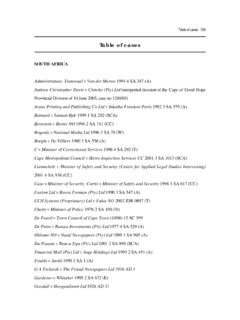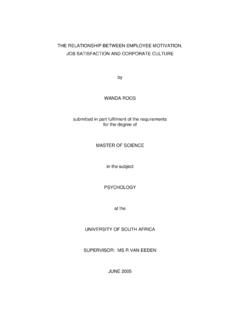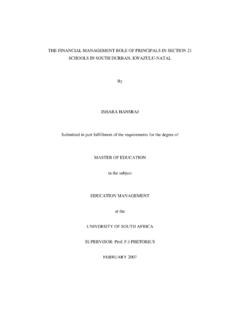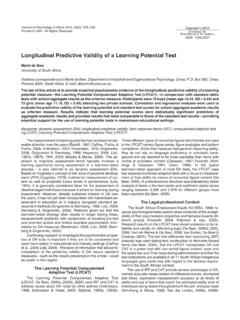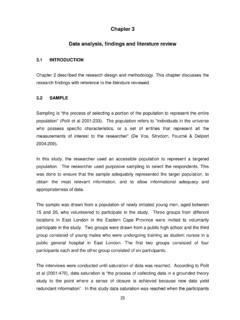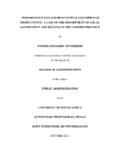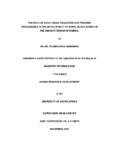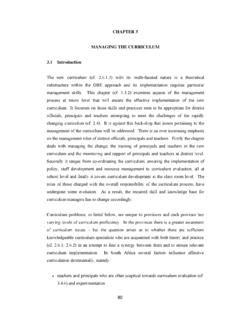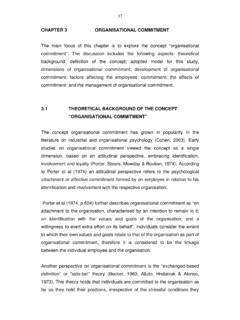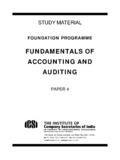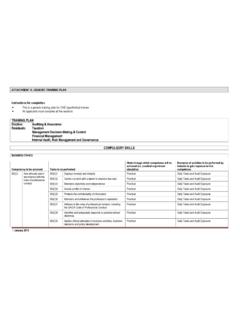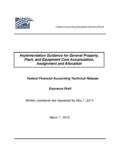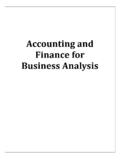Transcription of CHAPTER 2 THE HISTORY AND DEVELOPMENT OF …
1 10 CHAPTER 2 THE HISTORY AND DEVELOPMENT OF management accounting INTRODUCTION The previous CHAPTER defined the research problem and stated the main hypothesis for the study, namely that management accountants may not be able to contribute fully to the strategic management process in the future, as the skills required and displayed by management accountants do not meet the needs of the changing business environment. This hypothesis also indicates a growing gap between current tertiary management accounting education and the future requirements of management accounting practice.
2 A thorough understanding of the HISTORY and DEVELOPMENT of management accounting is required before the gap between education and practice can be investigated. Moreover, knowledge of the HISTORY of management accounting will facilitate an understanding of the future of this profession. As Plato said in 370 AD: .. and thus, the tale ( HISTORY ) was preserved, and did not perish; and it may also preserve us, if we will listen to its warnings; in which case we shall pass prosperously across the river .. and during the journey of a thousand years which we have described we may never cease to prosper (Plato 370AD) This CHAPTER firstly highlights the difference as well as the interdependence between management accounting and financial accounting .
3 The focus then shifts to historical developments in both these fields. Thirdly, the professional status of the management accountant is addressed as the study is relevant to practising management accountants. Finally, as the research for this study revolves around 11the current status of management accounting in South Africa, its HISTORY and DEVELOPMENT -- although limited -- will be investigated. INTERDEPENDENCE BETWEEN FINANCIAL accounting AND management accounting Although financial accounting and management accounting constitute two different fields of study, the one cannot exist without the other.
4 In order to understand this interdependence, the fields are defined and the relevant functions of each in the day-to-day business activities of an entity are described. The Oxford References online (2005:I) defines an accountant as a person who keeps or inspects financial accounts. The Oxford Business Dictionary (Isaacs & Martin 1993:89) adds a further dimension by defining accounting as to keep the books of account of an organisation and to provide advice on tax and other financial matters. Wyatt (2002:3) describes accounting as a discipline that seeks to provide information about a business entity.
5 Another recent definition of accounting is that of a [p]rocess of recording, measuring, interpreting and communicating financial data (Siegel & Shim 2005:6). Siegel and Shim (2005:6) also define accounting as an umbrella term which encompasses the multitude of disciplines including ..financial statement analyses and managerial accounting .** accounting information is therefore of crucial importance and financial managers in particular rely on this information to make decisions that will affect the entity or relationships within the entity. ** Thus in line with the Siegel and Shim (2005:6) definition of accounting where the word accounting is used throughout the text it is used interchangeably between financial and management accounting 12 Hansen and Mowen (1994:8) state that it is virtually impossible for managers to function without accounting information; managers need accounting information and need to know how to interpret and use it.
6 Moreover, they need a sound understanding of accounting in order to fulfil certain organisational roles and responsibilities ( plan, organise, lead and control) (De Wit & Hammersma 1992:5). Harrison and Hongren (2001:4) agrees with Hansen and Mowen (2005:4), and describes accounting as an information system that measures business activities, processes information into reports, and communicates the results to decision makers. accounting information is diverse, is used by both internal and external parties, and has therefore been classified into two subfields, namely financial accounting and management accounting (Harrison & Hongren 2001:6).
7 Marshall, McManus and Fiele (2004:6) describe financial accounting as primarily externally oriented, management accounting as having a primarily internal orientation. Financial accounting therefore provides information to parties outside the organisation ( creditors, investors, government agencies and the general public), whereas management accounting generates confidential information for use by an entity s management . Diagram below illustrates this distinction. 13 It is evident from Diagram that although financial accounting and management accounting are closely linked, financial accounting primarily provides summaries of past financial transactions whereas management accounting shows a strong future orientation.
8 management accounting is not bound by externally imposed reporting rules ( international financial reporting standards). It provides more detailed business information than financial accounting , and is more multidisciplinary than pure financial accounting . Diagram : Comparison of financial and management accounting Financial accounting management accounting Reports to: investors employees lenders suppliers and other creditors/ customers government agencies the public Reports to management for purposes of.
9 Planning directing and motivating controlling performance assessment and evaluation Emphasis on summaries of financial consequences of past activities and decisions Emphasis on decisions and activities affecting the future Emphasis on objectivity and verifiability of data Emphasis on relevance of data Precise information is required Timeous information is required Summarised data are prepared for the entire organisation Detailed segment reports are prepared on departments, products, customers and employees Must adhere to international financial reporting standards Need not adhere to international financial reporting standards Mandatory for external reports of companies Not mandatory for company reports Source: Garrison & Noreen 2006:7 14 The Oxford References online (2005:2) defines management accounting as the provision of financial data and advice to a company for use in the organisation and DEVELOPMENT of its business.
10 This definition highlights a fact that is clearly illustrated in Diagram , namely that the targeted users represent the essential difference between a management accountant (who utilises management accounting information) and a financial accountant (who focuses on external reporting). Both fields provide information, and both management accounting and financial accounting are part of the overall accounting information system (Hansen & Mowen 2005: 5). The reports submitted by these two accounting fields often derive information from the same database that was originally established to meet financial reporting requirements.
